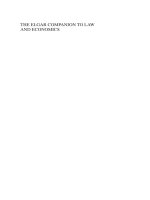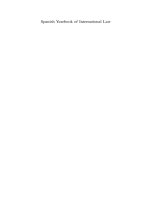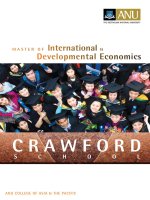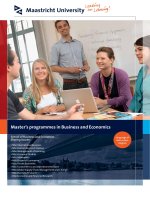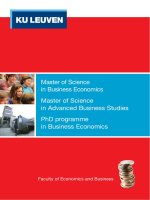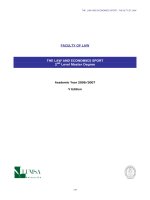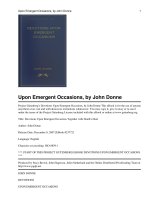MILE Master of International Law and Economics docx
Bạn đang xem bản rút gọn của tài liệu. Xem và tải ngay bản đầy đủ của tài liệu tại đây (408.3 KB, 5 trang )
MILE
Master of
International
Law and
Economics
—
The MILE programme is hosted
by the World Trade Institute (WTI), a
centre of excellence at the University
of Bern, Switzerland. It is the
world’s
rst and most comprehensive
programme
of advanced studies
focusing on the legal, economic and
international relations perspectives of
international trade regulation.
MILE is the right programme
for you if
… you have an undergraduate or higher
degree in a relevant eld, such as
economics, law or international relations.
… you have ideally had some practical
experience in international trade issues.
… you view an in-depth focus on
international trade as a good foundation
for your professional, academic and
intellectual development.
…you have a strong command of English.
A unique Master’s programme
A number of special characteristics set the
MILE programme apart from other Master’s
programmes:
– Be a MILE ahead: Acquire practical skills
and knowledge to meet the challenges of
global governance.
– Learn from the best: An outstanding
faculty of experts drawn from the ranks
of academia, international organisations
and leading law rms share their
knowledge with you.
– Experience new ways of learning:
Instruction is modular and
interdisciplinary with many courses
co-taught by experts from different
academic backgrounds and professions.
– Live and study in an international
environment: The WTI attracts students,
faculty and researchers from all over the
world.
– Be at the cutting edge of research:
The WTI hosts the Swiss National
Centre of Competence in Research on
Trade Regulation, allowing students to
interact daily with professors, postdoc
researchers and PhD students.
– Start a career: The WTI is well connected
with rms and institutions employing
MILE graduates and supports you in
nding the right job.
Programme structure
The MILE consists of three terms of
instruction (34 weeks).
First term: Foundations of Public
International Law; Economics (Micro- and
Macroeconomics, International Trade
Theory); International Political Economy
(including Business Perspectives on
International Trade and Investment);
Negotiating Skills; Legal Writing and
Analysis.
Second and third terms: In-depth
weekly modules on key issues in
international trade regulation including:
Non-discrimination; Tariffs and Non-
tariff Barriers; Regional Integration;
Competition; Trade Remedies; Trade Policy
Formulation; Health, Technical Barriers
to Trade, Sanitary and Phytosanitary
Measures, and Genetically Modied
Organisms; Trade in Services; Intellectual
Property Rights; Dispute Settlement; Trade
and Development; Agriculture; Trade and
Investment; Government Procurement;
Trade and Human Rights, Environment and
Climate Change.
The MILE programme concludes with
a Moot Court judged by WTO dispute
settlement experts and a three-month
period for writing the Master’s thesis.
The MILE faculty
Managing Director: T. Cottier
Director of Studies: P. Sauvé
F. Abbott, Florida State University College of Law |
D. Abdel Motaal, WTO | F. Addor, Swiss Federal
Institute of Intellectual Property | R. Anderson, WTO |
A. E. Appleton, Appleton Luff | M. Auboin, WTO |
O. Bochet, University of Bern | J. Bohanes, Sidley Austin LLP |
L. Boisson de Chazournes, University of Geneva |
M. Bronckers, Vermulst Verhaeghe Graafsma & Bronckers
|
S. Brown-Shai, WTI | M. Burri-Nenova, WTI | O. Cadot,
University of Lausanne | D. Cheong, Johns Hopkins
University - SAIS Bologna Center | W. Davey, University of
Illinois | P. Delimatsis, WTI | J. De Melo, University of
Geneva | Y. Devuyst, Vrije Universiteit Brussel |
V. Do Prado, WTO | L. Ehring, European Commission |
M. Elsig, WTI |
S. Evenett, University of St. Gallen |
R. Föllmi, University of Bern | P. Gugler, University of
Fribourg | C. Häberli, WTI |
B. Hoekman, World Bank |
P. Holmes, University of Sussex | G. Horlick, Law Ofces
of Gary N. Horlick | N. Imboden, IDEAS Centre |
M. Ineichen-Fleisch, SECO | M. Jansen, ILO | S. Jusoh, WTI |
B. Karapinar, WTI | C. Kaufmann, University of Zurich |
E. Kessie, WTO | R. Kolb, University of Geneva |
M. Krajewski, University of Bremen | E. Kwakwa, WIPO |
A. Lang, London School of Economics | P. Leblond,
University of Ottawa | W. Meng, Saarland University |
J. Miranda, King & Spalding | K. Nadakavukaren Schefer,
WTI, University of Basel | B. O’Connor, O’Connor &
Company | M. Oesch, University of Bern, Homburger AG |
M. Panizzon, WTI | S. Pryadarshi, WTO | K. Raphael,
International University Geneva | L. Rubini, Birmingham
Law School | M. Ruta, WTO | G. Stanton, WTO |
N. Stürchler, EDA | S. Tangermann, University of Tübingen
| V. Thorstensen, Mission of Brazil to the WTO | P. Van den
Bossche, Maastricht University | P. Vergano,
FratiniVergano | E. Vermulst, Vermulst Verhaeghe
Graafsma & Bronckers | S. Wunsch-Vincent, OECD |
A. Ziegler, University of Lausanne
The World Trade Institute
The World Trade Institute focuses on
research, training and advisory services in
the eld of international trade regulation.
Scholars and practitioners from all over
the world come to the WTI to exchange
insights and explore the boundaries of the
multilateral trading system.
About Bern
The World Trade Institute is located in the
capital of Switzerland. As a UNESCO World
Heritage Site, Bern provides a beautiful
setting with a broad variety of cultural
offerings. Skiing and hiking resorts in
the Bernese Alps or the Valais are easily
accessible. Studying in Bern will put you
in close proximity to Geneva, the site
of the WTO, various missions and other
institutions involved in governing the
multilateral trading system.
Applying to MILE
The application deadline is 31 March of
the proposed year of admission. To apply,
please ll in the application form (which
can be downloaded from our website
or
requested by sending an email to
inquire@
wti.org) and send it to us with
your CV, copies of your university degree(s)
and transcripts in English, results attesting
English language prociency, a statement
of purpose indicating why you would like to
study in the MILE programme, a personal
statement introducing yourself and two
letters of recommendation.
The MILE timetable
Lectures start in September and end at
the beginning of July of the following year
with vacations in December/January and
April. Each week of instruction consists of
20 hours of in-class learning. In the rst
term, you will be required to write mid- and
end-of-term exams. Course modules in the
second and third terms are assessed on a
weekly or bi-weekly basis.
MILE à la carte
The weekly MILE courses can be attended
in a exible, à la carte manner by external
participants for purposes of continuing
education or specialised training.
Costs
The tuition fee for MILE is CHF 30,000.
Scholarships and tuition waivers are
available for qualied applicants.
For additional information on the MILE
programme and the World Trade Institute,
please visit our website: www.wti.org
www.wti.org

